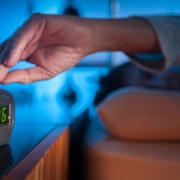BEEP! BEEP! BEEP! BEEP! An entire night has passed in the blink of an eye. The last thing you remember is your head hitting the pillow in the dark. Now, seemingly seconds later, the incessant, blaring of the alarm clock wakes you. But it does no help in reminding you what day it is, where you are, or perhaps even who you are.
Surely, you’ve experienced a morning like this: groggy, confused, and sleep-deprived. The effort to keep your eyes open feels exhausting. Standing up and leaving your warm bed behind is torturous. The day’s long to-do list awaits you and seems daunting.
Of course, you soldier on and make it through the day. But what does that day look like? It’s surely not smooth sailing, all quiet keyboard clicks and soothing, classical music. No, on days like this, you’re more likely to hear a cacophony of noises—the cell phone ringing, inbox pinging, and doors slamming after you in a hurry. All whilst trying to drown out the chatter in your head— “Don’t forget to do this!” and “I forgot to do that!”
Foregoing solid, quality sleep can affect your day in a big way. It’s important to remember that the effects of sleep deprivation are not just physical, like the physical feeling of exhaustion. Just like the scenario above, low-quality or insufficient sleep can manifest itself mentally and emotionally. That can include a loss of concentration, short attention span, and even anger. Lack of sleep can also mean a lack of motivation and sharp decision-making skills, forgetfulness, and anxiety.
Sleep is important for feeling rested, but it’s more than physical downtime. Sleep is also your brain’s chance to recharge and regroup. Let’s look more in-depth at the physical and mental benefits of regular, quality sleep.
Sleep and Health: The Pros and Cons
| Pro of Good Sleep | Con of Poor Sleep | |
| Mental | Solidifies memory retention and information recall | Decreases ability to concentrate |
| Enhances learning and problem-solving capabilities | Poor decision-making skills | |
| Increases alertness | Shorter attention span | |
| Boosts creativity | Lack of motivation | |
| Promotes adaptability and resiliency | Inability to cope with change | |
| Better regulation of emotions | Increases risk for feeling down | |
| Physical | Maintains cardiovascular health | Increases risk for cardiovascular and kidney issues |
| Helps regulate hormones associated with hunger | Increases risk of obesity | |
| Helps maintain normal blood sugar levels | Increases risk for blood-sugar issues | |
| Maintains healthy development, muscle growth, and tissue repair | Interruption of growth hormone secretion | |
| Supports strong immunity | Increases risk of common cold |
Science of Sleep: What Happens When You Snooze
Sleep gives your body and mind an opportunity to power down and recharge. It might seem like this period is simply an absence of consciousness, where the body goes into a sort of idling mode. However, during sleep, your body and brain are actually working hard. Sleep activates a process that helps you rest, repair, and recharge. Take a closer look at the processes during the four different stages of sleep.
Stage 1 is the period between wakefulness and sleep. In this stage, everything starts to slow down. Muscles soften, heart and breathing rates decrease, and brain-wave patterns begin to change.
Stage 2 is light sleep. Your muscles loosen even more, heart and breathing rates continue to slow, and your body temperature drops.
Stage 3 is the deepest sleep stage. Here, your heart and breathing rates come to the lowest point of the entire sleep cycle. Your muscles are extremely relaxed and rousing you would prove difficult. It’s this stage that is integral to quality sleep. Without enough time spent in this sleep state, you will not awaken feeling well-rested.
Stage 4 (the final stage of the sleep cycle) is known as REM sleep, or rapid eye movement sleep. The first three stages involve non-rapid eye movement sleep or non-REM (NREM).
In many other ways, REM is also quite the opposite of the preceding three stages. Heart rate increases and breathing rate can quicken and become irregular. Eyes move rapidly behind the eyelids and brain activity livens. Dreaming is commonly experienced during the REM sleep stage. Your body might actually experience temporary paralysis of the limbs, a protective measure to keep the body from acting out movements about which you dream.
These four stages are cycled through in succession until you wake up. It’s necessary for you to experience both NREM and REM sleep to remain sharp through the day. Without both, memory consolidation is harmed. As you’ve surely experienced, after a night of little-to-no sleep, it can be very difficult to recall even simple information quickly.
Factors Impacting Your Sleep
Good sleep can seem like a complex puzzle. Many factors can influence the quality and duration of your sleep. If you have trouble sleeping through the night, try keeping a journal to monitor the factors below. You can jot down notes throughout the day or write a quick summary before bed. Whichever your preferred method, having a daily snapshot of your diet, activity level, and emotional state can give you an idea of which of these things improve or harm your sleep quality:
- Caffeine: This stimulant usually wakes up the body and can keep you from feeling tired. In fact, caffeine actually blocks the substance adenosine, a chemical that your body secretes to make you sleepy. While this can be a benefit in the morning or during a long day, ingesting too much caffeine in the late afternoon or early evening can affect your sleep.
- Alcohol: Drinking too much alcohol too late in the evening can disrupt your sleep patterns. More specifically, it can disrupt your REM sleep, leaving your cycles incomplete. On a simpler level, alcohol is a diuretic, meaning it increases the urge to urinate more frequently. So, having too much alcohol can also disrupt your rest because you might have to make more frequent trips to the bathroom.
- Diet: The timing and content of your last meal can affect your readiness for bed. Think of the blood sugar surge that comes from a meal or snack. The boost in energy late in the day can keep you from winding down easily.
- Physical activity: Regular exercise can help you maintain a regular sleep schedule. Just don’t exercise too late in the evening before bed, or your body won’t have time to settle back down before turning in.
- Stress level and emotional state: Consider how stressful your day was or your emotional state throughout the day. If you’re feeling especially worn down, worried, or otherwise stressed, it can be very difficult to quiet your mind for bed.
- Bright lights: You’re constantly being bombarded by light, with can impact production of your sleep hormone. Make sure your room is dark, and take a break from bright screens (TV, phones, and tablets) before you tuck in.
7 Tips for Better Quality Rest
After journaling for a week, you may notice some patterns. Pay close attention to what these clues are trying to tell you. From these, you can create a personalized wind-down plan to prepare you for bedtime. If journaling isn’t your style, or you need some easy ideas, the seven tips for super sleep are below:
- Consider cutting back on how much caffeine you drink, or impose a “caffeine deadline”—a point at which you won’t ingest any more for the day.
- Drink alcohol in moderation or impose an “alcohol deadline” so that your body has time to readjust before bed.
- Avoid eating a meal or post-meal snack too late in the evening.
- Exercise regularly, preferably early in the day. A good starting point is 20 minutes per day—and work up from there.
- Plan for at least seven hours of sleep. You may need more than seven. But this is a good target to work up to if you’re currently and routinely getting less than this benchmark. While you may not be able to reach seven hours immediately, start incrementally heading for bed sooner so the change is gradual and more doable.
- Set a regular bedtime and waking time—and stick to it, even on weekends. This kind of routine is helpful for keeping your body’s internal clock in rhythm.
- Incorporate relaxation or meditation into your wind-down routine. Turn off screens, dim your bedroom lights, play light instrumental music. Light stretching can help your body release tension before laying down.
About the Author
Jenna Templeton is a health educator and freelance science writer living in Salt Lake City, Utah. After receiving a bachelor of science degree in chemistry from Virginia Tech, Jenna spent five years as a research scientist in the nutritional industry. This work fueled her interest in personal wellness, leading her to pursue a graduate degree in Health Promotion & Education from the University of Utah. Outside of work, Jenna enjoys live music, gardening, all things food, and playing in the Wasatch mountains.

















